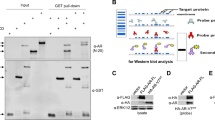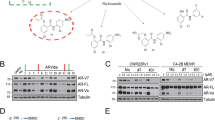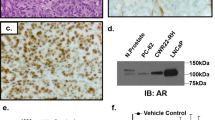Abstract
Androgen receptor splicing variants (ARVs) that lack the ligand-binding domain (LBD) are associated with the development of castration-resistant prostate cancer (CRPC), including resistance to the new generation of high-affinity anti-androgens. However, the mechanism by which ARV expression is regulated is not fully understood. In this study, we show that the activation of classical nuclear factor-kappa B (NF-κB) signaling increases the expression of ARVs in prostate cancer (PCa) cells and converts androgen-sensitive PCa cells to become androgen-insensitive, whereas downregulation of NF-κB signaling inhibits ARV expression and restores responsiveness of CRPC to anti-androgen therapy. In addition, we demonstrated that combination of anti-androgen with NF-κB-targeted therapy inhibits efficiently tumor growth of human CRPC xenografts. These results indicate that induction of ARVs by activated NF-κB signaling in PCa cells is a critical mechanism by which the PCa progresses to CRPC. This has important implications as it can prolong the survival of CRPC patients by restoring the tumors to once again respond to conventional androgen-deprivation therapy (ADT).
This is a preview of subscription content, access via your institution
Access options
Subscribe to this journal
Receive 50 print issues and online access
$259.00 per year
only $5.18 per issue
Buy this article
- Purchase on Springer Link
- Instant access to full article PDF
Prices may be subject to local taxes which are calculated during checkout






Similar content being viewed by others
References
Knudsen KE, Scher HI . Starving the addiction: new opportunities for durable suppression of AR signaling in prostate cancer. Clin Cancer Res 2009; 15: 4792–4798.
Tran C, Ouk S, Clegg NJ, Chen Y, Watson PA, Arora V et al. Development of a second-generation antiandrogen for treatment of advanced prostate cancer. Science 2009; 324: 787–790.
de Bono JS, Logothetis CJ, Molina A, Fizazi K, North S, Chu L et al. Abiraterone and increased survival in metastatic prostate cancer. N Engl J Med 2011; 364: 1995–2005.
Yuan X, Balk SP . Mechanisms mediating androgen receptor reactivation after castration. Urol Oncol 2009; 27: 36–41.
Yuan X, Cai C, Chen S, Chen S, Yu Z, Balk SP . Androgen receptor functions in castration-resistant prostate cancer and mechanisms of resistance to new agents targeting the androgen axis. Oncogene 2013; 33: 2815–2825.
Dehm SM, Schmidt LJ, Heemers HV, Vessella RL, Tindall DJ . Splicing of a novel androgen receptor exon generates a constitutively active androgen receptor that mediates prostate cancer therapy resistance. Cancer Res 2008; 68: 5469–5477.
Hu R, Dunn TA, Wei S, Isharwal S, Veltri RW, Humphreys E et al. Ligand-independent androgen receptor variants derived from splicing of cryptic exons signify hormone-refractory prostate cancer. Cancer Res 2009; 69: 16–22.
Guo Z, Yang X, Sun F, Jiang R, Linn DE, Chen H et al. A novel androgen receptor splice variant is up-regulated during prostate cancer progression and promotes androgen depletion-resistant growth. Cancer Res 2009; 69: 2305–2313.
Sun S, Sprenger CC, Vessella RL, Haugk K, Soriano K, Mostaghel EA et al. Castration resistance in human prostate cancer is conferred by a frequently occurring androgen receptor splice variant. J Clin Invest 2010; 120: 2715–2730.
Watson PA, Chen YF, Balbas MD, Wongvipat J, Socci ND, Viale A et al. Inaugural Article: Constitutively active androgen receptor splice variants expressed in castration-resistant prostate cancer require full-length androgen receptor. Proc Natl Acad Sci USA 2010; 107: 16759–16765.
Li Y, Chan SC, Brand LJ, Hwang TH, Silverstein KA, Dehm SM . Androgen receptor splice variants mediate enzalutamide resistance in castration-resistant prostate cancer cell lines. Cancer Res 2013; 73: 483–489.
Hu R, Isaacs WB, Luo J . A snapshot of the expression signature of androgen receptor splicing variants and their distinctive transcriptional activities. Prostate 2011; 71: 1656–1667.
Hu R, Lu C, Mostaghel EA, Yegnasubramanian S, Gurel M, Tannahill C et al. Distinct transcriptional programs mediated by the ligand-dependent full-length androgen receptor and its splice variants in castration-resistant prostate cancer. Cancer Res 2012; 72: 3457–3462.
Li Y, Alsagabi M, Fan D, Bova GS, Tewfik AH, Dehm SM . Intragenic rearrangement and altered RNA splicing of the androgen receptor in a cell-based model of prostate cancer progression. Cancer Res 2011; 71: 2108–2117.
Li Y, Hwang TH, Oseth LA, Hauge A, Vessella RL, Schmechel SC et al. AR intragenic deletions linked to androgen receptor splice variant expression and activity in models of prostate cancer progression. Oncogene 2012; 31: 4759–4767.
Nadiminty N, Tummala R, Liu C, Yang J, Lou W, Evans CP et al. NF-kappaB2/p52 induces resistance to enzalutamide in prostate cancer: role of androgen receptor and its variants. Mol Cancer Ther 2013; 12: 1629–1637.
DiDonato JA, Hayakawa M, Rothwarf DM, Zandi E, Karin M . A cytokine-responsive IkappaB kinase that activates the transcription factor NF-kappaB. Nature 1997; 388: 548–554.
Regnier CH, Song HY, Gao X, Goeddel DV, Cao Z, Rothe M . Identification and characterization of an IkappaB kinase. Cell 1997; 90: 373–383.
Mercurio F, Zhu H, Murray BW, Shevchenko A, Bennett BL, Li J et al. IKK-1 and IKK-2: cytokine-activated IkappaB kinases essential for NF-kappaB activation. Science 1997; 278: 860–866.
Rothwarf DM, Karin M . The NF-kappa B activation pathway: a paradigm in information transfer from membrane to nucleus. Sci STKE 1999; 5: RE1.
Ghosh S, Karin M . Missing pieces in the NF-kappaB puzzle. Cell 2002; 109 (Suppl): S81–S96.
Luo JL, Kamata H, Karin M . IKK/NF-kappaB signaling: balancing life and death—a new approach to cancer therapy. J Clin Invest 2005; 115: 2625–2632.
Senftleben U, Cao Y, Xiao G, Greten FR, Krahn G, Bonizzi G et al. Activation by IKKalpha of a second, evolutionary conserved, NF-kappa B signaling pathway. Science 2001; 293: 1495–1499.
Karin M . Nuclear factor-kappaB in cancer development and progression. Nature 2006; 441: 431–436.
Karin M . NF-kappaB and cancer: mechanisms and targets. Mol Carcinog 2006; 45: 355–361.
Inoue J, Gohda J, Akiyama T, Semba K . NF-kappaB activation in development and progression of cancer. Cancer Sci 2007; 98: 268–274.
Pacifico F, Leonardi A . NF-kappaB in solid tumors. Biol Chem Pharmacol 2006; 72: 1142–1152.
Lessard L, Begin LR, Gleave ME, Mes-Masson AM, Saad F . Nuclear localisation of nuclear factor-kappaB transcription factors in prostate cancer: an immunohistochemical study. Br J Cancer 2005; 93: 1019–1023.
Lessard L, Karakiewicz PI, Bellon-Gagnon P, Alam-Fahmy M, Ismail HA, Mes-Masson AM et al. Nuclear localization of nuclear factor-kappaB p65 in primary prostate tumors is highly predictive of pelvic lymph node metastases. Clin Cancer Res 2006; 12: 5741–5745.
Domingo-Domenech J, Mellado B, Ferrer B, Truan D, Codony-Servat J, Sauleda S et al. Activation of nuclear factor-kappaB in human prostate carcinogenesis and association to biochemical relapse. Br J Cancer 2005; 93: 1285–1294.
Domingo-Domenech J, Oliva C, Rovira A, Codony-Servat J, Bosch M, Filella X et al. Interleukin 6, a nuclear factor-kappaB target, predicts resistance to docetaxel in hormone-independent prostate cancer and nuclear factor-kappaB inhibition by PS-1145 enhances docetaxel antitumor activity. Clin Cancer Res 2006; 12: 5578–5586.
Ismail HA, Lessard L, Mes-Masson AM, Saad F . Expression of NF-kappaB in prostate cancer lymph node metastases. Prostate 2004; 58: 308–313.
Ross JS, Kallakury BV, Sheehan CE, Fisher HA, Kaufman RP Jr, Kaur P et al. Expression of nuclear factor-kappa B and I kappa B alpha proteins in prostatic adenocarcinomas: correlation of nuclear factor-kappa B immunoreactivity with disease recurrence. Clin Cancer Res 2004; 10: 466–4672.
Setlur SR, Royce TE, Sboner A, Mosquera JM, Demichelis F, Hofer MD et al. Integrative microarray analysis of pathways dysregulated in metastatic prostate cancer. Cancer Res 2007; 67: 10296–10303.
McCall P, Bennett L, Ahmad I, Mackenzie LM, Forbes IW, Leung HY et al. NFkappaB signalling is upregulated in a subset of castrate-resistant prostate cancer patients and correlates with disease progression. Br J of Cancer 2012; 107: 1554–1563.
Gannon PO, Lessard L, Stevens LM, Forest V, Begin LR, Minner S et al. Large-scale independent validation of the nuclear factor-kappa B p65 prognostic biomarker in prostate cancer. Eur J Cancer 2013; 49: 2441–2448.
Min J, Zaslavsky A, Fedele G, McLaughlin SK, Reczek EE, De Raedt T et al. An oncogene-tumor suppressor cascade drives metastatic prostate cancer by coordinately activating Ras and nuclear factor-kappaB. Nat Med 2010; 16: 286–294.
Zhang L, Altuwaijri S, Deng F, Chen L, Lal P, Bhanot UK et al. NF-kappaB regulates androgen receptor expression and prostate cancer growth. Am J Pathol 2009; 175: 489–499.
Jin RJ, Lho Y, Connelly L, Wang Y, Yu X, Saint Jean L et al. The nuclear factor-kappaB pathway controls the progression of prostate cancer to androgen-independent growth. Cancer Res 2008; 68: 6762–6769.
Jin R, Sterling JA, Edwards JR, DeGraff DJ, Lee C, Park SI et al. Activation of NF-kappa B signaling promotes growth of prostate cancer cells in bone. PLoS ONE 2013; 8: e60983.
Claessens F, Denayer S, Van Tilborgh N, Kerkhofs S, Helsen C, Haelens A . Diverse roles of androgen receptor (AR) domains in AR-mediated signaling. Nucl Recept Signal 2008; 6: e008.
Diessenbacher P, Hupe M, Sprick MR, Kerstan A, Geserick P, Haas TL et al. NF-kappaB inhibition reveals differential mechanisms of TNF versus TRAIL-induced apoptosis upstream or at the level of caspase-8 activation independent of cIAP2. J Invest Dermatol 2008; 128: 1134–1147.
Leverkus M, Sprick MR, Wachter T, Denk A, Brocker EB, Walczak H et al. TRAIL-induced apoptosis and gene induction in HaCaT keratinocytes: differential contribution of TRAIL receptors 1 and 2. J Invest Dermatol 2003; 121: 149–155.
Adams J, Kauffman M . Development of the proteasome inhibitor Velcade (Bortezomib). Cancer Investig 2004; 22: 304–311.
Scher HI, Beer TM, Higano CS, Anand A, Taplin ME, Efstathiou E et al. Antitumour activity of MDV3100 in castration-resistant prostate cancer: a phase 1-2 study. Lancet 2010; 375: 1437–1446.
Mostaghel EA, Marck BT, Plymate SR, Vessella RL, Balk S, Matsumoto AM et al. Resistance to CYP17A1 inhibition with abiraterone in castration-resistant prostate cancer: induction of steroidogenesis and androgen receptor splice variants. Clin Cancer Res 2011; 17: 5913–5925.
di Sant'Agnese PA . Neuroendocrine differentiation in prostatic carcinoma: an update. Prostate Suppl 1998; 8: 74–79.
Singh D, Febbo PG, Ross K, Jackson DG, Manola J, Ladd C et al. Gene expression correlates of clinical prostate cancer behavior. Cancer Cell 2002; 1: 203–209.
Taplin ME, George DJ, Halabi S, Sanford B, Febbo PG, Hennessy KT et al. Prognostic significance of plasma chromogranin a levels in patients with hormone-refractory prostate cancer treated in Cancer and Leukemia Group B 9480 study. Urology 2005; 66: 386–391.
Berruti A, Mosca A, Tucci M, Terrone C, Torta M, Tarabuzzi R et al. Independent prognostic role of circulating chromogranin A in prostate cancer patients with hormone-refractory disease. Endocr Relat Cancer 2005; 12: 109–117.
Akfirat C, Zhang X, Ventura A, Berel D, Colangelo ME, Miranti CK et al. Tumour cell survival mechanisms in lethal metastatic prostate cancer differ between bone and soft tissue metastases. J Pathol 2013; 230: 291–297.
Yu X, Wang Y, DeGraff DJ, Wills ML, Matusik RJ . Wnt/beta-Catenin activation promotes prostate tumor progression in a mouse model. Oncogene 2011; 30: 1868–1879.
Grasso CS, Wu YM, Robinson DR, Cao X, Dhanasekaran SM, Khan AP et al. The mutational landscape of lethal castration-resistant prostate cancer. Nature 2012; 487: 239–243.
Jin RJ, Wang Y, Masumori N, Ishii K, Tsukamoto T, Shappell SB et al. NE-10 neuroendocrine cancer promotes the LNCaP xenograft growth in castrated mice. Cancer Res 2004; 64: 5489–5495.
Morris MJ, Kelly WK, Slovin S, Ryan C, Eicher C, Heller G et al. A phase II trial of bortezomib and prednisone for castration resistant metastatic prostate cancer. J Urol 2007; 178: 2378–2383.
Papandreou CN, Daliani DD, Nix D, Yang H, Madden T, Wang X et al. Phase I trial of the proteasome inhibitor bortezomib in patients with advanced solid tumors with observations in androgen-independent prostate cancer. J Clin Oncol 2004; 22: 2108–2121.
Kraft AS, Garrett-Mayer E, Wahlquist AE, Golshayan A, Chen CS, Butler W et al. Combination therapy of recurrent prostate cancer with the proteasome inhibitor bortezomib plus hormone blockade. Cancer Biol Ther 2011; 12: 119–124.
Lin DL, Tarnowski CP, Zhang J, Dai J, Rohn E, Patel AH et al. Bone metastatic LNCaP-derivative C4-2B prostate cancer cell line mineralizes in vitro. Prostate 2001; 47: 212–221.
Livak KJ, Schmittgen TD . Analysis of relative gene expression data using real-time quantitative PCR and the 2(-Delta Delta C(T)) Method. Methods 2001; 25: 402–408.
Everhart MB, Han W, Sherrill TP, Arutiunov M, Polosukhin VV, Burke JR et al. Duration and intensity of NF-kappaB activity determine the severity of endotoxin-induced acute lung injury. J Immunol 2006; 176: 4995–5005.
Tuominen VJ, Ruotoistenmaki S, Viitanen A, Jumppanen M, Isola J . ImmunoRatio: a publicly available web application for quantitative image analysis of estrogen receptor (ER), progesterone receptor (PR), and Ki-67. Br Cancer Res 2010; 12: R56.
Acknowledgements
We thank Dr Martin Leverkus (University of Magdeburg, Germany) for providing us with IKK2-EE and IKK2-KD retroviral vectors, and Tom C Case and Manik Paul for technical assistance. This work was supported to RJ by the Department of Defense (DOD) Prostate Cancer Research Program (PCRP; W81XWH-10-1-0236); to RJM by the National Cancer Institute (4R01 CA076142-14) and the Frances Preston Laboratories of the TJ Martell Foundation.
Author information
Authors and Affiliations
Corresponding author
Ethics declarations
Competing interests
The authors declare no conflict of interest.
Additional information
Supplementary Information accompanies this paper on the Oncogene website
Supplementary information
Rights and permissions
About this article
Cite this article
Jin, R., Yamashita, H., Yu, X. et al. Inhibition of NF-kappa B signaling restores responsiveness of castrate-resistant prostate cancer cells to anti-androgen treatment by decreasing androgen receptor-variant expression. Oncogene 34, 3700–3710 (2015). https://doi.org/10.1038/onc.2014.302
Received:
Revised:
Accepted:
Published:
Issue Date:
DOI: https://doi.org/10.1038/onc.2014.302
This article is cited by
-
Synthetic lethality in personalized cancer therapy
Genome Instability & Disease (2022)
-
The Anti-cancer Effect of Olea europaea L. Products: a Review
Current Nutrition Reports (2021)
-
Inhibition of glycolysis ameliorate arthritis in adjuvant arthritis rats by inhibiting synoviocyte activation through AMPK/NF-кB pathway
Inflammation Research (2020)
-
Androgen promotes differentiation of PLZF+ spermatogonia pool via indirect regulatory pattern
Cell Communication and Signaling (2019)
-
Synthetic essentiality of chromatin remodelling factor CHD1 in PTEN-deficient cancer
Nature (2017)



